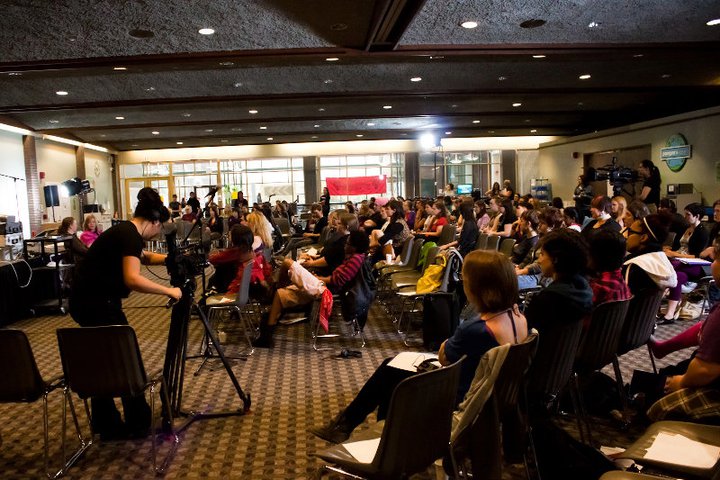As a workshop facilitator at the 2011 RebELLEs gathering at the University of Winnipeg, I facilitated an afternoon of discussion regarding poverty and anti-capitalism. We began by sharing what had brought us to the workshop and responses varied from those who were at the beginning of their journey into feminism to those who had studied such issues and were well aware of the issues associated with poverty and capitalism from personal experience.
As someone who has been deeply moved by the work of Marilyn Waring, I was very excited to facilitate this workshop. Waring, for anyone who has not yet read her work, provided an analysis of how “they don’t count our work, but they count on our work” in regards to the invisibility of women’s work to economists and policy makers.
We worked very hard to brainstorm, analyze, and ultimately narrow down a common focus regarding anti-capitalism. We began from an assumption about the relationship between poverty and capitalism and one definition of capitalism that stood out in our discussion was that it is “a system that cannot exist if we eradicate poverty.” Eradicating poverty is an aim we hear from various groups, but it is not always acknowledged how capitalism and poverty are intimately linked.
Within the brief two and a half hour workshop, participants discussed the importance of human rights, the social safety net, the banking and economic system and education. There were so many insights to record, our note takers were kept very busy. Discussion of the education system focused on how current curriculum normalizes and legitimizes capitalist values and how a way to challenge this is to focus education on creativity; human rights-based curriculum was also seen as a possible counter-point to how capitalism has shaped education (including language).
It was extremely valuable to conduct this workshop using a collective structure and consensus model. In order to narrow down and summarize what our group wanted to advance to the larger collective, we used the dot-mocracy method. This method allows each participant to vote on several options regarding topics they felt most passionately about advancing to the larger group for further discussion and actions.
Our group was intent on considering some of the macro-level policies and structures that are maintaining capitalism in Canada (and globally). Through dot-mocracy, it was determined that social programs should be strengthened to ensure all basic needs are met and to address the education system in order to teach materials from a critical thinking perspective that promotes and protects human rights and inclusivity.
The third (and arguably most radical recommendation) put forth by the group was to forgive all debt and make charging interest illegal. I think it is fair to say that the charging of interest on money loaned will continue for quite some time into the future. So was there value in advancing this type of recommendation? I would argue yes. In addition to discussing more manageable, realistic changes we can do at the personal and community level to challenge capitalism, it is important that we understand the ways in which systems control our lives; the charging of interest is one practice that has a deeply negative impact on those in poverty who today face continual increase in the cost of basic goods while incomes (and social assistance rates) do not keep pace with these increases.
It was a valuable afternoon spent discussing anti-capitalism from a feminist perspective. I think Marilyn Waring would be proud.
Lisa Bednar is currently working as an instructor at the University of Manitoba. Her feminism started at a young age and she is hopeful that someday, all of women’s work will count and be counted!




